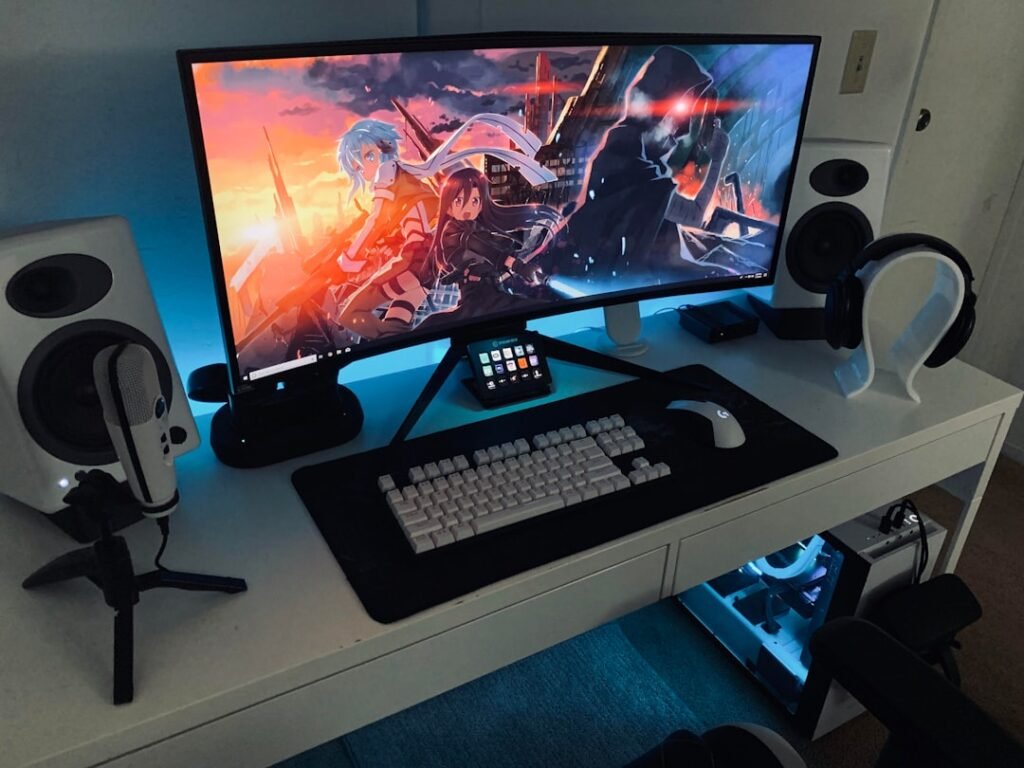Now Reading: Gaming Industry Jobs: How to Break into the Business
-
01
Gaming Industry Jobs: How to Break into the Business
Gaming Industry Jobs: How to Break into the Business

As I delve into the world of gaming, I find it fascinating to explore the vast landscape that comprises this dynamic industry. The gaming sector is not just about playing video games; it encompasses a multitude of roles, from game design and programming to marketing and community management. Each facet of the industry contributes to the creation of immersive experiences that captivate millions of players worldwide.
I’ve come to realize that understanding the gaming industry requires a comprehensive look at its history, current trends, and future potential. The evolution of gaming has been nothing short of remarkable. From the early days of pixelated graphics and simple gameplay mechanics to today’s hyper-realistic environments and complex narratives, the industry has transformed dramatically.
I often reflect on how technological advancements, such as virtual reality and artificial intelligence, are reshaping the way we interact with games. As I navigate this landscape, I recognize that staying informed about industry trends is crucial for anyone aspiring to make a mark in this field. Whether it’s the rise of mobile gaming or the increasing importance of eSports, understanding these elements helps me identify where my interests might align within this vibrant ecosystem.
Key Takeaways
- The gaming industry is a rapidly growing and evolving field with diverse career opportunities.
- Identifying your skills and interests is crucial for finding the right career path within the gaming industry.
- There are various education and training options available, including traditional degrees and specialized programs.
- Building a strong portfolio showcasing your work is essential for standing out in the competitive gaming industry.
- Networking and making connections with professionals in the industry can open up new opportunities for career growth.
Identifying Your Skills and Interests
Reflecting on What Excites Me
I began by reflecting on what aspects of gaming excite me the most. Is it the storytelling, the technical challenges of programming, or perhaps the artistic side of game design? By pinpointing my passions, I can better focus my efforts on areas where I can excel.
Assessing My Skills
I’ve taken the time to assess my existing skills. Am I a natural problem solver? Do I have a knack for visual arts or a strong understanding of coding languages? Recognizing these strengths allows me to leverage them as I pursue opportunities in the gaming industry.
Seeking Feedback and Building Confidence
I’ve also sought feedback from peers and mentors, which has provided me with valuable insights into areas where I can improve. This self-assessment process has not only clarified my career path but has also instilled a sense of confidence in my abilities.
Education and Training Options

As I consider my future in the gaming industry, I realize that education plays a pivotal role in shaping my career trajectory. There are numerous pathways to gain the knowledge and skills necessary for success. Traditional degree programs in game design, computer science, or interactive media offer a structured approach to learning.
These programs often provide a solid foundation in both theory and practical application, equipping me with essential skills that are highly valued by employers. However, I’ve also discovered that formal education is not the only route to success. Online courses and boot camps have emerged as popular alternatives, offering flexibility and targeted learning experiences.
Platforms like Coursera and Udemy provide access to courses taught by industry professionals, allowing me to learn at my own pace while focusing on specific areas of interest. Additionally, attending workshops and seminars can provide hands-on experience and networking opportunities that are invaluable in this competitive field.
Building a Portfolio
One of the most critical steps in establishing myself in the gaming industry is building a robust portfolio. This collection of work showcases my skills and creativity, serving as tangible evidence of my capabilities to potential employers. I’ve learned that a well-curated portfolio should include a variety of projects that highlight different aspects of my skill set.
Whether it’s a game prototype I developed, artwork I created, or code snippets demonstrating my programming abilities, each piece contributes to a comprehensive representation of who I am as a creator. In addition to showcasing completed projects, I’ve found it beneficial to include works-in-progress or personal projects that reflect my passion for gaming. This not only demonstrates my commitment to continuous improvement but also allows me to express my unique style and vision.
As I compile my portfolio, I pay close attention to presentation; a clean, professional layout can make a significant difference in how my work is perceived. Ultimately, my portfolio serves as both a reflection of my journey thus far and a stepping stone toward future opportunities.
Networking and Making Connections
In the gaming industry, networking is an essential component of career development. I’ve come to understand that building relationships with industry professionals can open doors to opportunities that may not be advertised publicly. Attending gaming conventions, conferences, and local meetups has allowed me to connect with like-minded individuals who share my passion for gaming.
These interactions often lead to valuable insights and advice from those who have navigated similar paths. Social media platforms like LinkedIn and Twitter have also proven to be powerful tools for networking. By following industry leaders and engaging in discussions about current trends, I can stay informed while also making connections with professionals who may be willing to offer guidance or mentorship.
I’ve learned that networking is not just about seeking job opportunities; it’s about building genuine relationships based on shared interests and mutual support within the gaming community.
Applying for Entry-Level Positions

As I prepare to enter the workforce, applying for entry-level positions is both exciting and daunting. I’ve realized that crafting a compelling resume and cover letter is crucial in making a positive first impression on potential employers. Tailoring my application materials to highlight relevant skills and experiences demonstrates my genuine interest in the role and the company.
I take care to showcase any projects from my portfolio that align with the job description, emphasizing how my background makes me a suitable candidate. Additionally, I’ve learned the importance of persistence in this process. The gaming industry can be highly competitive, and rejection is often part of the journey.
Rather than becoming discouraged, I view each application as an opportunity to refine my approach and learn from feedback. By staying proactive and continuously seeking out new opportunities, I increase my chances of landing an entry-level position that aligns with my career goals.
Internships and Apprenticeships
Internships and apprenticeships have emerged as invaluable stepping stones in my pursuit of a career in gaming. These experiences provide hands-on training and exposure to real-world projects, allowing me to apply what I’ve learned in a professional setting. I actively seek out internship opportunities at game development studios or related companies, recognizing that these positions often lead to full-time employment down the line.
During my internships, I’ve had the chance to collaborate with experienced professionals who have shared their knowledge and insights with me.
Additionally, internships allow me to build connections within the industry, further expanding my network and increasing my visibility among potential employers.
Freelancing and Contract Work
As I explore various avenues within the gaming industry, freelancing has become an appealing option for gaining experience while maintaining flexibility in my career path. Taking on freelance projects allows me to work on diverse assignments that align with my interests while building my portfolio simultaneously. Whether it’s designing assets for an indie game or providing programming support for a small studio, each project contributes to my growth as a professional.
Freelancing also offers me the opportunity to develop essential business skills, such as client communication and project management. By managing my own workload and deadlines, I gain valuable insights into the realities of working in the industry. While freelancing can come with its own set of challenges—such as inconsistent income—I find it rewarding to take charge of my career trajectory while pursuing projects that ignite my passion for gaming.
Continuing Education and Skill Development
In an ever-evolving industry like gaming, continuous education is paramount for staying relevant and competitive. I’ve made it a priority to seek out opportunities for skill development beyond formal education. Online tutorials, webinars, and workshops allow me to learn new techniques or software tools that can enhance my capabilities as a game developer or designer.
Moreover, participating in game jams has become one of my favorite ways to challenge myself creatively while collaborating with others. These events push me out of my comfort zone and encourage experimentation with new ideas and concepts. By embracing lifelong learning, I ensure that I remain adaptable in an industry characterized by rapid technological advancements.
Advancing Your Career in the Gaming Industry
As I gain experience in the gaming industry, I’m increasingly focused on advancing my career beyond entry-level positions. Setting clear goals for myself has become essential; whether it’s aiming for a promotion within my current role or transitioning into a specialized area like game design or project management, having a roadmap helps me stay motivated. I’ve learned that seeking mentorship from experienced professionals can provide valuable guidance as I navigate this journey.
Their insights into career progression can help me identify opportunities for growth within organizations or suggest additional skills I should develop. Additionally, actively participating in industry events allows me to stay connected with emerging trends while positioning myself as an engaged member of the gaming community.
Navigating Challenges and Staying Resilient
The path toward a successful career in gaming is not without its challenges; however, resilience has become one of my most valuable assets throughout this journey. Rejections from job applications or setbacks during projects can be disheartening, but I’ve learned to view these experiences as opportunities for growth rather than failures. Embracing a growth mindset allows me to adapt quickly and learn from mistakes.
Moreover, maintaining a healthy work-life balance is crucial for sustaining motivation over time. Engaging in hobbies outside of gaming helps me recharge creatively while providing perspective on challenges within the industry. By cultivating resilience through self-care practices and maintaining a positive outlook, I am better equipped to navigate obstacles as they arise on my path toward success in the gaming world.
In conclusion, embarking on a career in the gaming industry requires dedication, self-awareness, and continuous learning. By understanding the landscape of this dynamic field, identifying my skills and interests, pursuing education options, building a portfolio, networking effectively, applying for positions strategically, seeking internships or freelance opportunities, committing to ongoing skill development, advancing thoughtfully within organizations while remaining resilient through challenges—I am confident that I can carve out a fulfilling career in this exciting industry that continues to evolve at an astonishing pace.
If you are interested in breaking into the gaming industry, you may also want to check out this article on top 5 multiplayer games that are still going strong in 2025.
Additionally, understanding the gaming landscape can also help you make informed decisions about your career path within the industry.
FAQs
What are some common gaming industry jobs?
Some common gaming industry jobs include game designer, game developer, game tester, game artist, game producer, and game marketer.
What skills are required to work in the gaming industry?
Skills required to work in the gaming industry include programming, graphic design, storytelling, project management, marketing, and knowledge of gaming trends and technology.
What education is needed to break into the gaming industry?
While a formal education in game design, computer science, or a related field can be beneficial, it is possible to break into the gaming industry with a strong portfolio and relevant experience.
What are some tips for breaking into the gaming industry?
Some tips for breaking into the gaming industry include building a strong portfolio, networking with industry professionals, gaining relevant experience through internships or freelance work, and staying up-to-date with industry trends.
What are the job prospects in the gaming industry?
The gaming industry continues to grow, offering a wide range of job prospects in various roles such as game development, design, marketing, and production. However, competition for positions can be fierce.



























